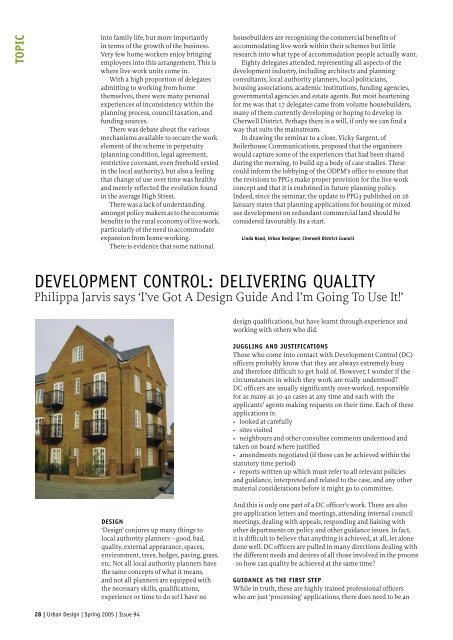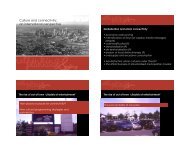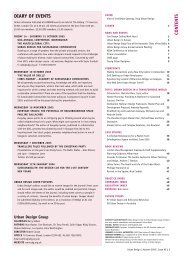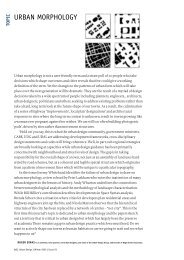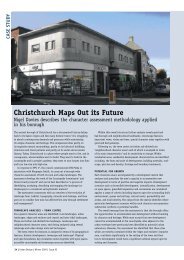CONTENTS DIARY OF EVENTS - The Urban Design Group
CONTENTS DIARY OF EVENTS - The Urban Design Group
CONTENTS DIARY OF EVENTS - The Urban Design Group
You also want an ePaper? Increase the reach of your titles
YUMPU automatically turns print PDFs into web optimized ePapers that Google loves.
TOPIC<br />
28 | <strong>Urban</strong> <strong>Design</strong> | Spring 2005 | Issue 94<br />
into family life, but more importantly<br />
in terms of the growth of the business.<br />
Very few home-workers enjoy bringing<br />
employees into this arrangement. This is<br />
where live-work units come in.<br />
With a high proportion of delegates<br />
admitting to working from home<br />
themselves, there were many personal<br />
experiences of inconsistency within the<br />
planning process, council taxation, and<br />
funding sources.<br />
<strong>The</strong>re was debate about the various<br />
mechanisms available to secure the work<br />
element of the scheme in perpetuity<br />
(planning condition, legal agreement,<br />
restrictive covenant, even freehold vested<br />
in the local authority), but also a feeling<br />
that change of use over time was healthy<br />
and merely reflected the evolution found<br />
in the average High Street.<br />
<strong>The</strong>re was a lack of understanding<br />
amongst policy makers as to the economic<br />
benefits to the rural economy of live-work,<br />
particularly of the need to accommodate<br />
expansion from home-working.<br />
<strong>The</strong>re is evidence that some national<br />
DESIGN<br />
‘<strong>Design</strong>’ conjures up many things to<br />
local authority planners – good, bad,<br />
quality, external appearance, spaces,<br />
environment, trees, hedges, paving, grass,<br />
etc. Not all local authority planners have<br />
the same concepts of what it means,<br />
and not all planners are equipped with<br />
the necessary skills, qualifications,<br />
experience or time to do so! I have no<br />
housebuilders are recognising the commercial benefits of<br />
accommodating live-work within their schemes but little<br />
research into what type of accommodation people actually want.<br />
Eighty delegates attended, representing all aspects of the<br />
development industry, including architects and planning<br />
consultants, local authority planners, local politicians,<br />
housing associations, academic institutions, funding agencies,<br />
governmental agencies and estate agents. But most heartening<br />
for me was that 17 delegates came from volume housebuilders,<br />
many of them currently developing or hoping to develop in<br />
Cherwell District. Perhaps there is a will, if only we can find a<br />
way that suits the mainstream.<br />
In drawing the seminar to a close, Vicky Sargent, of<br />
Boilerhouse Communications, proposed that the organisers<br />
would capture some of the experiences that had been shared<br />
during the morning, to build up a body of case studies. <strong>The</strong>se<br />
could inform the lobbying of the ODPM’s office to ensure that<br />
the revisions to PPG3 make proper provision for the live-work<br />
concept and that it is enshrined in future planning policy.<br />
Indeed, since the seminar, the update to PPG3 published on 26<br />
January states that planning applications for housing or mixed<br />
use development on redundant commercial land should be<br />
considered favourably. Its a start.<br />
Linda Rand, <strong>Urban</strong> <strong>Design</strong>er, Cherwell District Council<br />
DEVELOPMENT CONTROL: DELIVERING QUALITY<br />
Philippa Jarvis says ‘I’ve Got A <strong>Design</strong> Guide And I’m Going To Use It!’<br />
design qualifications, but have learnt through experience and<br />
working with others who did.<br />
JUGGLING AND JUSTIFICATIONS<br />
Those who come into contact with Development Control (DC)<br />
officers probably know that they are always extremely busy<br />
and therefore difficult to get hold of. However, I wonder if the<br />
circumstances in which they work are really understood?<br />
DC officers are usually significantly over-worked, responsible<br />
for as many as 30-40 cases at any time and each with the<br />
applicants’ agents making requests on their time. Each of these<br />
applications is:<br />
• looked at carefully<br />
• sites visited<br />
• neighbours and other consultee comments understood and<br />
taken on board where justified<br />
• amendments negotiated (if these can be achieved within the<br />
statutory time period)<br />
• reports written up which must refer to all relevant policies<br />
and guidance, interpreted and related to the case, and any other<br />
material considerations before it might go to committee.<br />
And this is only one part of a DC officer’s work. <strong>The</strong>re are also<br />
pre-application letters and meetings, attending internal council<br />
meetings, dealing with appeals, responding and liaising with<br />
other departments on policy and other guidance issues. In fact,<br />
it is difficult to believe that anything is achieved, at all, let alone<br />
done well. DC officers are pulled in many directions dealing with<br />
the different needs and desires of all those involved in the process<br />
- so how can quality be achieved at the same time?<br />
GUIDANCE AS THE FIRST STEP<br />
While in truth, these are highly trained professional officers<br />
who are just ‘processing’ applications, there does need to be an


